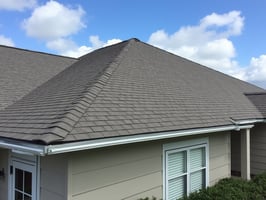If you’re a homeowner in North Carolina, especially in coastal areas prone to severe weather, you...
Understanding the Benefits of FORTIFIED Roofs for NC Homeowners
As a homeowner in North Carolina, safeguarding your property from the elements is paramount. With our state’s propensity for severe weather, particularly hurricanes and heavy storms, investing in a resilient roof is one of the best decisions you can make. This is where the FORTIFIED Roof designation comes into play. In this blog post, we’ll explore what a FORTIFIED Roof is, its benefits, and why it’s a wise investment for homeowners.
What Is a FORTIFIED Roof?
The FORTIFIED Roof designation is part of a program developed by the Insurance Institute for Business & Home Safety (IBHS). This program provides rigorous standards for building and retrofitting roofs to better withstand severe weather events, particularly high winds and heavy rain. To achieve the FORTIFIED Roof certification, a roof must meet specific criteria designed to mitigate damage from wind-related events, making it a robust option for homeowners in vulnerable areas like North Carolina.
The FORTIFIED Standards
To earn the FORTIFIED Roof designation, roofs must be constructed or upgraded according to specific engineering and building standards. These standards include:
-
Enhanced Structural Integrity: The roof must be designed to resist wind uplift and pressure, which means using stronger materials and more secure fastening methods.
-
Improved Deck Attachment: Roof decking must be properly secured to the rafters or trusses, reducing the chances of roof deck failure during a storm.
-
Properly Installed Underlayment: The underlayment should provide extra protection against water intrusion, especially in vulnerable areas.
-
Quality Roofing Materials: Homeowners are encouraged to use high-quality, durable materials that can withstand harsh weather conditions.
-
Detailed Inspections: Homes must undergo inspections by certified FORTIFIED Evaluators to ensure that the standards have been met throughout the installation process.
Why Should You Consider a FORTIFIED Roof?
1. Increased Resilience to Severe Weather
The primary benefit of a FORTIFIED Roof is its enhanced ability to withstand severe weather events. Given North Carolina’s susceptibility to hurricanes and tropical storms, a roof that meets FORTIFIED standards can significantly reduce the risk of damage during such events. This is crucial not only for your home’s safety but also for your peace of mind.
2. Potential Insurance Discounts
Many insurance companies recognize the value of a FORTIFIED Roof and offer premium discounts to homeowners who invest in this designation. By reducing the risk of wind damage, insurers may lower your homeowner’s insurance rates, translating to significant long-term savings.
3. Increased Home Value
A FORTIFIED Roof not only protects your home but can also enhance its resale value. As more buyers become aware of the benefits of resilient building practices, having a FORTIFIED Roof can set your home apart in the market, making it more attractive to potential buyers.
4. Energy Efficiency
Fortified roofs often incorporate modern materials and installation techniques that improve energy efficiency. This can lead to lower heating and cooling costs over time, offering additional savings on your monthly utility bills.
5. Warranty Benefits
Many contractors who install FORTIFIED Roofs offer extended warranties on their work and materials. This added protection means you can enjoy peace of mind knowing that your investment is backed by a reliable guarantee.
The FORTIFIED Roof Installation Process
1. Choose a Qualified Contractor
To ensure that your roof meets FORTIFIED standards, it’s essential to hire a contractor experienced in FORTIFIED construction methods. You can find a list of participating contractors through the IBHS or your local building authority.
2. Conduct a Roof Evaluation
Before installation, a qualified contractor will assess your current roof to determine what improvements are necessary. This evaluation is crucial for creating a comprehensive plan to achieve FORTIFIED certification.
3. Implement Recommended Improvements
Once the evaluation is complete, the contractor will implement the recommended improvements. This may include reinforcing structural components, installing upgraded materials, and ensuring proper installation techniques.
4. Undergo Inspections
Throughout the installation process, your contractor will conduct inspections to ensure that the work meets FORTIFIED standards. After completion, a certified FORTIFIED Evaluator will perform a final inspection to confirm compliance.
5. Obtain FORTIFIED Certification
Once your roof has met all the necessary standards and passed inspection, you will receive the FORTIFIED Roof designation. This certification is a testament to the quality and durability of your new roof.
Conclusion
Investing in a FORTIFIED Roof is one of the smartest choices a North Carolina homeowner can make. With enhanced protection against severe weather, potential insurance discounts, and an increase in property value, the benefits are substantial. Plus, with a focus on energy efficiency and long-term durability, a FORTIFIED Roof represents a commitment to both safety and sustainability.
If you’re considering upgrading your roof, consult with your insurance agent and local contractors about the FORTIFIED Roof program. At our independent insurance agency, we can guide you through the process and help you understand the potential savings on your homeowner’s insurance. Protect your home, save money, and enjoy peace of mind—take the first step towards a FORTIFIED Roof today!
For more information about the FORTIFIED Roof designation and how to get started, don’t hesitate to reach out. We’re here to assist you every step of the way!


